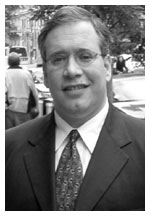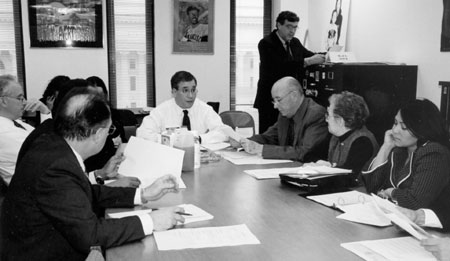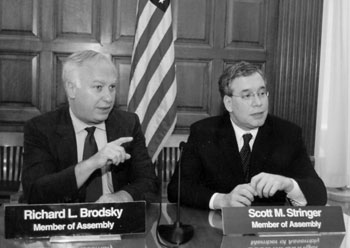|
2004 Legislative Accomplishments
Vendor Legislation
Since 1894, New York State Statute has provided disabled American veterans a blanket exemption from any
municipal law limiting hawking or peddling. The objective of the law was to financially assist wounded war
veterans.
During the 2004 Session, the Committee advanced legislation to amend, and make permanent, the provisions
regulating disabled veteran vendors in New York City. The legislation authorized an additional forty-five disabled
veterans to vend within the Midtown Manhattan core and increased, from one to two, the number of disabled
veterans authorized to vend on a block where disabled veterans are exclusively authorized to vend. This law
includes language to protect the rights of veterans and to appease public safety concerns due to overly crowded
sidewalks. A one-time legacy transfer of a disabled veteran vending license to a spouse, adult child or to the
guardian of a dependent child was included. It also included special provisions to ensure that if the City lifts
current restrictions on general vending in certain parts of the City, disabled veteran vendors will no longer be
restricted from vending in those areas. Out of respect for the lives lost on September 11, 2001, the legislation
prohibits all sidewalk-vending on the streets surrounding and adjacent to the World Trade Center site.
(Chapter 11 of 2004)
Coordinated Construction Act of Lower Manhattan
In recognition of the damage suffered by Lower Manhattan after the 2001 attack on the World Trade Center
and the concerted effort of the State and the City to see the redevelopment of Lower Manhattan completed,
the Committee reported legislation that will assist both parties in the reconstruction effort. The legislation
allows City agencies to compile a list of pre-qualified bidders; previously, this authority was held only by
State agencies. Certain qualifying criteria to be met by qualified bidders are outlined in the bill, including the
requirement that a bidder have a positive history of protecting the health and safety of workers, and that a bidder
demonstrate a commitment to working with minority- and women-owned businesses. In addition, larger contracts
may be awarded only to bidders who offer a skilled apprenticeship program.
In order to facilitate timely and cost effective redevelopment construction in Lower Manhattan, this act will allow
City agencies to jointly bid with utility and telecommunication companies on infrastructure repair projects, and
City agencies will be able to purchase supplies cooperatively. In an effort to cause the least environmental harm
in the process, all non-road vehicles used on redevelopment projects will be required to use ultra-low sulfur
diesel fuel. (Chapter 259 of 2004)
Building Code Enforcement
Last session, the Committee advanced legislation to strengthen building code enforcement in multiple dwellings
in New York City. The bill would require inspectors of the Building Department to record all building violations and
to notify the appropriate agencies regarding any hazardous conditions not within the inspector’s jurisdiction.
The bill would enable tenants to petition the Department for an inspection and the inspector would be required to
provide all tenants with a copy of the report of violations. The Department of Buildings also would be required to
devise a system of random checks to determine if violations had been remedied. In addition, this bill would create
the temporary New York City Housing Oversight Commission to oversee building code enforcement efforts. The
Commission would make recommendations to the appropriate agencies and would report its activities and goals
to the City Council and to the Mayor regularly. (A.8117 Stringer)
Empire Zone Program Reform
When first proposed by the Assembly, the Empire Zones Program represented an innovative economic development
tool that provided tax incentives for job creation within specified distressed communities. Unfortunately, the
implementation and management of this program has been woefully inadequate. Many eligible businesses
have been left out of the program, while businesses that have failed to create jobs have continued to receive
lucrative zone benefits.
It is past time that we reform a program exhibiting such potential to boost New York’s economy.
Passage of the Assembly’s Empire Zones reform package would restore the integrity of this program
and return the Empire Zones Program to its original intent of job creation in New York State.
|


 Chairperson Stringer with members of the Assembly Committee on Cities at work debating
legislation at a committee meeting on February 8, 2005.
Chairperson Stringer with members of the Assembly Committee on Cities at work debating
legislation at a committee meeting on February 8, 2005.
 Chairperson Stringer and Assemblyman Richard Brodsky, Chairperson of the
Committee on Corporations, Authorities, and Commissions, hear testimony
regarding the redevelopment of Manhattan’s Far West Side.
Chairperson Stringer and Assemblyman Richard Brodsky, Chairperson of the
Committee on Corporations, Authorities, and Commissions, hear testimony
regarding the redevelopment of Manhattan’s Far West Side.